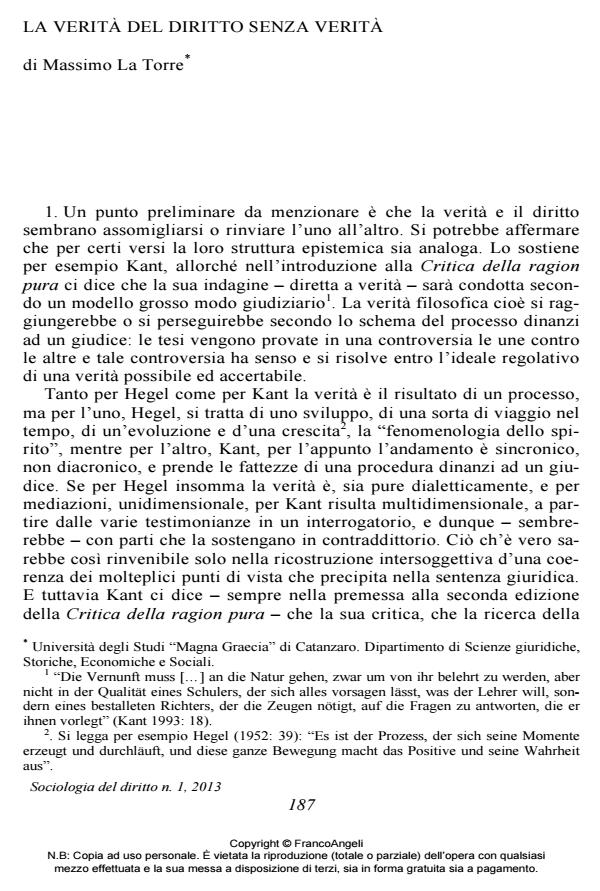The truth of the law without truth
Journal title SOCIOLOGIA DEL DIRITTO
Author/s Massimo La Torre
Publishing Year 2013 Issue 2013/1 Language Italian
Pages 13 P. 187-199 File size 189 KB
DOI 10.3280/SD2013-001014
DOI is like a bar code for intellectual property: to have more infomation
click here
Below, you can see the article first page
If you want to buy this article in PDF format, you can do it, following the instructions to buy download credits

FrancoAngeli is member of Publishers International Linking Association, Inc (PILA), a not-for-profit association which run the CrossRef service enabling links to and from online scholarly content.
The positive law tradition and even legal modernism seem to suggest it would be advisable to maximise the distance between the production of law and the ascertainment of truth. These two fields are kept decidedly and apparently clearly separate. Law is construed as truth, or is superimposed on it, only for those who espouse the natural law doctrine or for clerics, but once the positive and procedural origins of the law are recognised secularly, the logical consequence ought to be to proceed to preach the truth. Thus goes the thesis of law without truth, which is also offered as a political or ethical option. The truth in law could thus only be authoritarian, so it would be beneficial to do without it. An abstentionist or non-cognitive attitude is what suits lawyers best. That, at least, is what is held by exponents of positive law. Nevertheless, what they contrast with the truth is not the freedom of the independent individual, but the authority of the sovereign power, whose legitimacy derives from being a remedy for the cognitive deficiency and lack of truth that afflicts the law and in general the experience of lawgiving. The article discusses this theoretical construct and wonders whether a law without truth would be capable of holding up without a truth of its own that would not be solely descriptive, but also once again a source of lawgiving.
Keywords: Concept of law, Truth, Positive law doctrine, Metaethical non-cognitivism, Natural law doctrine, Facts and values
- Dworkin, Ronald, 2011. Justice for Hedgehogs. Cambridge (MA): Harvard University Press.
- Ferrajoli, Luigi, 1983. La semantica della teoria del diritto. In Uberto Scarpelli (a cura di), La teoria generale del diritto: Problemi e tendenze attuali. Milano: Edizioni di Comunità. —, 2007a. Principia iuris: Teoria del diritto e della democrazia: 1. Teoria del diritto. Roma-Bari: Laterza. —, 2007b. Principia iuris: Teoria del diritto e della democrazia: 2. Teoria della democrazia. Roma-Bari: Laterza
- Häberle, Peter, [1995] 2000. Diritto e verità. Torino: Einaudi
- Hegel, Georg Wilhelm Friedrich, [1807] 1952. Phänomenologie des Geistes, a cura di Johannes Hoffmeister. Hamburg: Felix Meiner
- Irti, Natalino, 2011. Diritto senza verità. Roma-Bari: Laterza
- Kant, Immanuel, [1787] 1993. Vorrede zur zweiten Auflage. In Id., Kritik der reinen Vernunft, a cura di Raymund Schmidt. Hamburg: Felix Meiner
- Kelsen, Hans, [1979] 1985. Teoria generale delle norme. Torino: Einaudi
- Mackie, John L., 1977. Ethics: Inventing Right and Wrong. London: Penguin Books.
- Nietzsche, Friedrich, [1873] 2011. Su verità e menzogna in senso extramorale. In Id., Su verità e menzogna in senso extramorale e altri scritti. Roma: Editori Internazionali Riuniti
- Patterson, Dennis, 1996. Law and Truth. Oxford: Oxford University Press
- Pintore, Anna, 1996. Il diritto senza verità. Torino: Giappichelli
- Putnam, Hilary 2002. The Collapse of the Fact/Value Dichotomy and Other Essays. Cambridge (MA): Harvard University Press
- Ross, Alf, [1968] 1978. Direttive e norme. Milano: Edizioni di Comunità
- Scarpelli, Uberto, 1984. Auctoritas non veritas facit legem. Rivista di filosofia, 75, 1: 29-43
- Waldron, Jeremy, 1992. The Irrelevance of Moral Objectivity. In Robert P. George (a cura di), Natural Law Theory: Contemporary Essays. Oxford: Oxford University Press. —, 1996. Kant’s Legal Positivism. Harvard Law Review, 109, 7: 1535-1566.
- Weinberger, Ota, 1992. Moral und Vernunft: Beiträge zu Ethik, Gerechtigkeitstheorie und Normenlogik. Wien: Böhlau.
Massimo La Torre, La verità del diritto senza verità in "SOCIOLOGIA DEL DIRITTO " 1/2013, pp 187-199, DOI: 10.3280/SD2013-001014